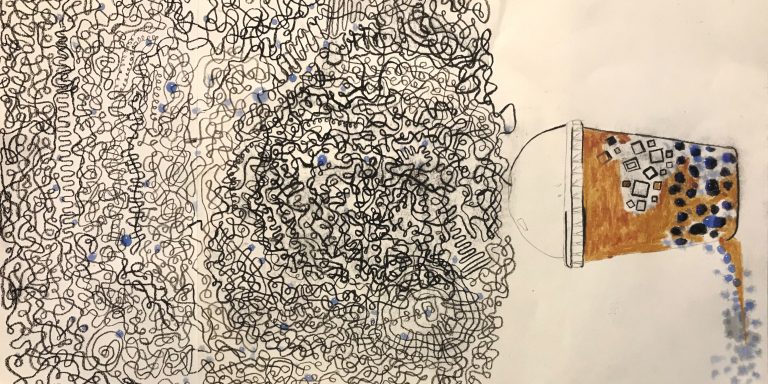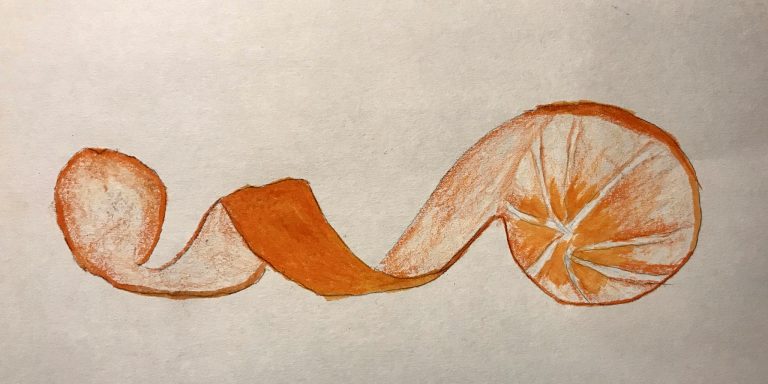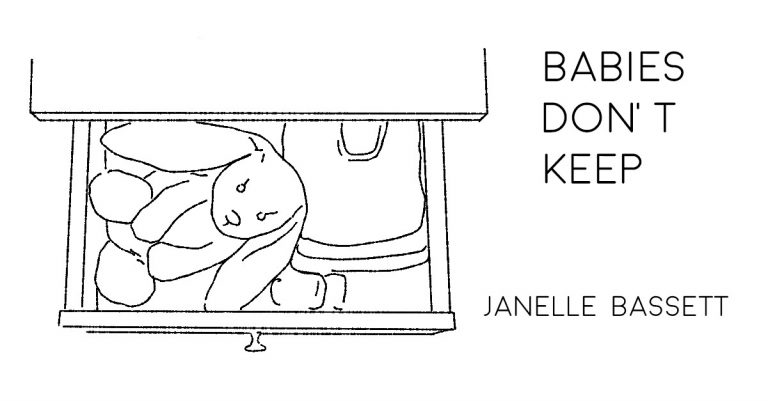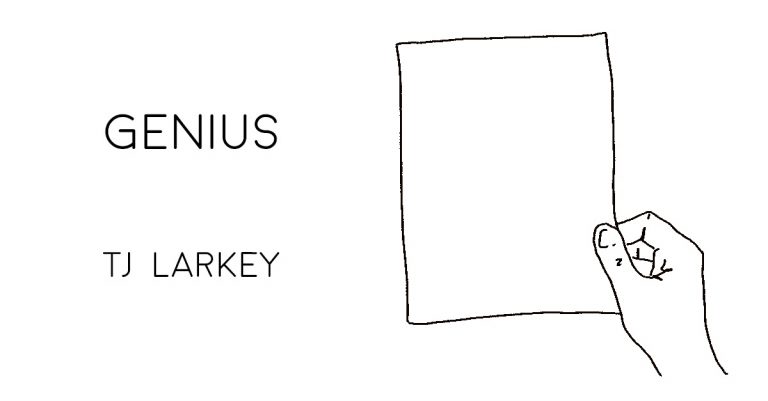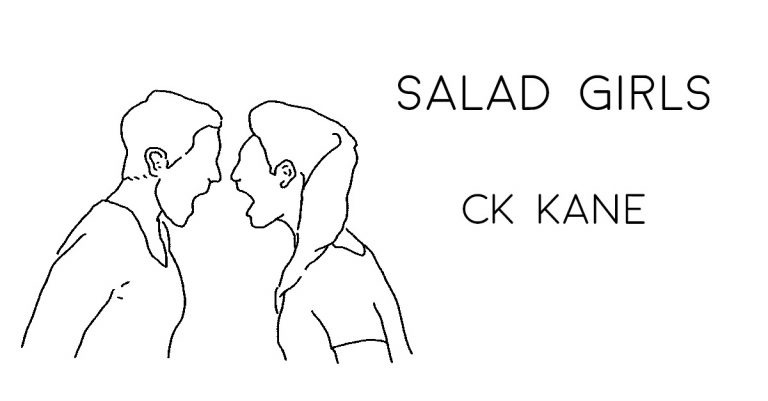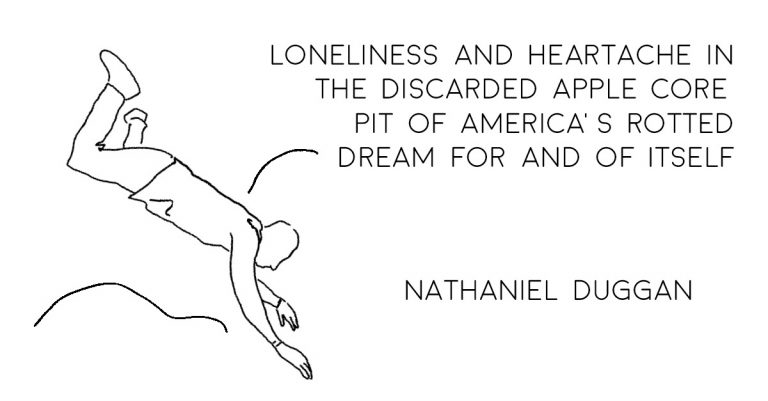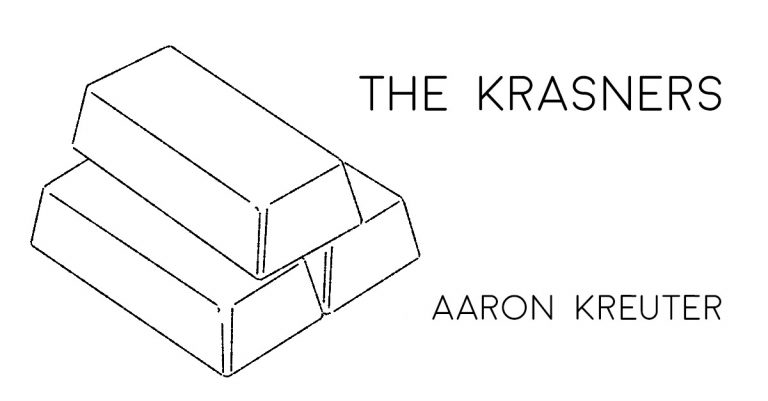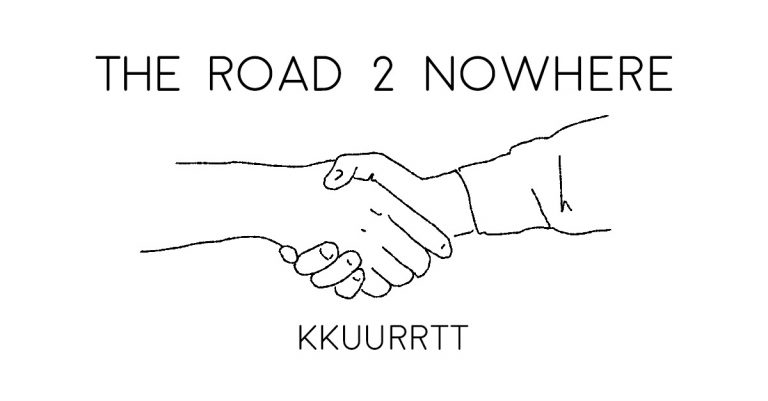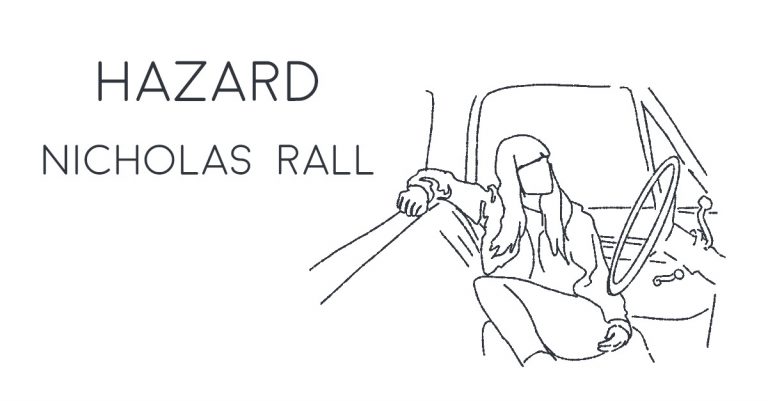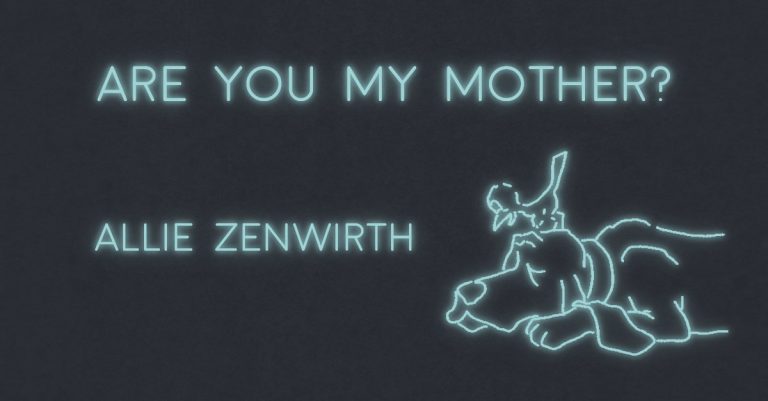When I think back to those days it is fear that I remember, fear that I keep returning to, fear that I cannot get away from. First there’s the free-floating, general fear of adolescence: the fear of fitting in, the fear of saying the right thing, the fear of a body under revolt. And, for the most part, it wasn’t on the school playground or the mall food court, but at Kol B’Seder, the Reform synagogue my parents joined when I was twelve, where the major battles against these fears were waged. I fell in love in those hallways, made friends during those Thursday evening and Saturday morning classes, tested boundaries, discovered limits, and, thanks to a liberal focus on the Holocaust, came face-to-face with the depravity that every human society is capable of. We read harrowing accounts of Jewish children from Germany, Poland, and Holland, had elderly survivors come speak to us every couple of months, and on Yom HaShoah, we watched the videos. All the kids would pile into the sanctuary—I would sit with Mitzy, Erin, and Stephanie, and sometimes Paul Cohen would leave his own friends and come join us—and we would watch archival footage of the camps, interviews with survivors, fictional retellings of the Wannsee conference, of the Warsaw Uprising, of the Nuremberg Trials. How many years of watching tractors organize hills of bodies does it take to give you lifelong nightmares (of course, the burn of the Holocaust was always immediately remedied with the balm of Israel: footage of the Declaration of Independence, grainy news briefs on the pioneering Israeli spirit, the wonders of the Kibbutz, the marvel of Tel Aviv, the Jewish city built in the desert)?
My shul life was separate, distinct, from my school one, a parallel narrative to my daily existence, a place where I could reinvent myself, learn from my social blunders, try new things. My parents found what they were looking for too, I suppose: having recently relocated from Montreal, and knowing nobody in Toronto, they managed to find friends, connection, community. We were invited in with open arms: Friday night potlucks, Saturday morning services that would end almost every week with a bagels-and-tuna Kiddush celebrating the most recent bar or bat mitzvah, the holidays strung through the Jewish year like an uneven necklace; there were retreats, clubs, brotherhoods, sisterhoods, youth groups, Torah study groups, lecture series, sports leagues, cooking classes, and it was all ours for the admission price of membership and the sacrifice of sitting through forty-five minutes of guitar-backed prayers most Friday nights.
But that’s not what I’m here to tell you about; I’m here to tell you about the Krasners. The Krasners were royalty at Kol B’Seder, one of the original six founding families. David Krasner was president-emeritus, head usher, and a major donor and philanthropist, his name appearing regularly in both the Jewish and city papers. He was a big man, with a deep, commanding voice, and we were all terrified of him (as head usher he especially picked on Erin, who happened to often be the loudest person in the room). Geri Krasner was president of the sisterhood, second soloist in the choir, and head of fundraising for the shul’s annual trip to Israel. Though unofficial, they had two seats reserved for them in the second row of the sanctuary, where, unless they were on one of their frequent family trips to New York City, they would be found every Friday night, Saturday morning, guest lecture, and holiday large or small. They had five children: Joanna, Neta, Yoni, Daniel, and Stephanie. Joanna and Neta were older than us and were both off in the States at small, expensive liberal arts colleges; Yoni and Daniel both played competitive hockey and were hardly ever around; Stephanie, who was a year older than I was, played guitar, wrote short stories about desperate people lost in grotesque urban environments, wore her sisters’ hand-me-downs, and was as confident as you would expect a beautiful, rich, creative, sheltered fourteen-year-old to be. She was the only Krasner child to spend time with us. Does it even need to be said that I was in love with her? I don’t know if I recall the first time we were invited to the Krasners’ mansion, or if all of those early nights are jumbled in my memory (how my parents managed to ingratiate themselves so quickly into Kol B’Seder’s inner circle I have no idea). What I do know is that in the fall of my thirteenth year, my bar mitzvah already receding into the past, we were there almost every Saturday night, along with five or six other families from the shul: the Brickmans, the Golds, the Cohens, the Mitzcovitzes, the Hoffmans, the Krasners, and us. They were raucous nights of food, arguments, unrequited teenage passion, discovery.
The Krasner estate was situated on two acres of forest off the Bridal Path, and still is, without a doubt, the biggest house I have ever been in. Though unbelievably large—not deep, but wide—it was old, unrenovated, and deeply lived in. The front door opened into a tiled foyer, the double-wide white-carpet staircase spiraling to the second floor. When the kitchen was built in the mid-eighties it must have been state-of-the-art, and had a separate eating area and breakfast nook; the dining room table could easily sit sixteen; and the living and family room walls were adorned with David and Geri’s various awards, commendations, and photos of trips to Israel and the family at their New York apartment. A door in the kitchen led into the mudroom, which was the size of our school gym, with big sliding doors leading out to the woods and ravine behind the house and three separate entrances to the three self-contained heated garages. Next to the mudroom was the indoor pool, next to the indoor pool was the old stables that Krasner had renovated into a floor hockey rink for the boys, complete with stands and a scoreboard. We never went upstairs.
The basement, accessible from an open staircase in the living room and a dark, enclosed one off the pool that used to lead to the servant quarters, was a long narrow hallway traversing the length of the house, with keypad-locked doors on either side. The only room in the basement we had access to was the entertainment room, which was where we spent most of our time. We could shut the door while we were down there, be as loud and silly as we wanted: mostly we would watch Arnold Schwarzenegger VHSes and listen to Adam Sandler albums, kill ourselves laughing at Paul Cohen’s jokes and dirty behaviour. Paul brimmed with sexual innuendo, Sandler-influenced voices, and what I guess I would call now teenage bravura; without his own friends around, Paul lavished us with attention. I would try to laugh just the right amount, be careful what I said, hope my absolute devotion to the seventeen-year-old Paul was not as obvious to everybody else as it was to me, try and not break out in sweat whenever Stephanie Krasner was on the same side of the room as me, strumming her guitar or reading one of her thrillingly dark stories. Regular nights in the life of a shy, sensitive boy.
There is one night in particular that I would continue to go back to again and again, as if to locate some sense of forewarning, of premonition. My uncle Menachem had joined the Montreal exodus, was staying with us for a few weeks before his visa came through and he could head to the coast, where he had some friends in a folk band that were going to take him on as guitar tech, and he had joined us at the Krasners for Saturday night dinner. It was after we had eaten and everybody under thirty-five had already gone to the basement, but I was still sitting at the table, next to my Mom. I was fascinated by my uncle, enthralled by the way he engaged with others. He just didn’t follow the same social conventions of the other adults in my life: he would argue, he would cut, he wouldn’t let hyperbole or hypocrisy or xenophobia pass him by. He wore his curly hair halfway between short and acceptably long, had shown up at our door with nothing but a worn banjo case and a suitcase full of old sweaters and threadbare slacks, and was vocally opposed to every single thing I was being taught to value: the Western world, the market economy, the eons-long persecution of the Jews. It was like nothing I had ever known, and to see him in the same room as David Krasner was worth missing out on whatever was going on downstairs.
As I knew they would, it was only a few minutes into their coffee before they got into it. They had been talking about the situation in Quebec, when Geri Krasner mentioned something about Israel. As I remember it now, I happened to be looking at my parents as a wave of worry passed over their faces.
“Israel? Israel?” Menachem said. “I don’t see what Israel has to do with any of this.” My mother and Menachem grew up in a strict religious household; their father, my grandfather, was a famous rabbi of some kind, he wrote a treatise on some arcane Talmudic matter that was still required reading to those who read treatises on arcane Talmudic matters. When he died everything religious in their household disappeared, which included my grandfather’s fervent Zionism. Joining Kol B’Seder was the first non-secular thing my mother had done since she was a teenager, and for the month he was with us Menachem never tired of making fun of her for it.
Geri looked personally hurt. “Israel has everything to do with it,” she said. “Israel is what keeps us safe.”
“Safe? Safe?! I can tell you, I don’t feel safe knowing that, as it turns out, when you give Jews an army and a nuclear bomb they mistreat it as readily as anybody else. The state of Israel was supposed to be a bastion of ethical power, a light unto the nations, and look what they’ve done with it! Oppression, occupation, racism, all backed—not to mention—by US money and warplanes!” Menachem was talking animatedly, using his hands for emphasis, his curls bouncing against his forehead.
“You’re a very strange man,” Geri said, barely controlling her anger. “How can you say these things, with the way the world is going right now? With what’s happening in our own country for Christ’s sake?!”
“I still feel safer here, knowing I’m not a part of the machinery of occupation. Sometimes it’s better to be the powerless one.”
At this, all eyes turned to Krasner. David, unlike my uncle and Geri, was calm, collected, loudly sipping his coffee. We all knew his story, he came once a year to religious school to remind anyone who could possibly forget: his parents were born over there, in Europe, were survivors. They had lost three children, David’s ghost siblings, as well as their entire extended families; the climax of David’s harrowing familial saga, which he would always build to with exquisite suspense, centered on his mother’s white gold engagement ring, which she had kept hidden, with great difficulty, until, in 1944, she traded it for the roast chicken and civilian clothes that ended up saving their lives. After spending two years as DPs in Europe they had come to Canada with absolutely nothing, spent the rest of their lives working and building a life for David. When Krasner Sr. died, the young Krasner took over his father’s small factory, and within ten years had turned it into the international company it was today. David’s talk to us would always end with him imploring us to not grow too complacent: “it could happen again, even here, even in Canada,” he would intone in his most stentorian voice. Imagine unloading that on a bunch of children. The last time he had spoken, Stephanie had raised her hand (is it any wonder Stephanie’s stories were so bleak?). “Daddy,” she asked, “what are you doing to fight against complacency? We seem pretty complacent to me.” As in love with her as I already was, now I was in awe of her—pushing back against the most feared man at shul, no matter that it was also her father. “Don’t underestimate your old man, Stephy,” Krasner had said, causing some cautious laughter from the audience, “I’m in a constant state of preparedness. Nothing is going to catch us off guard. Trust me.” But I’m getting away from the story. Back to the kitchen table: surely David wouldn’t let Menachem’s comment slide, and it looked like he was getting ready to speak, but Menachem beat him to it. The slight pause in conversation had pushed him into an even higher level of agitation.
“I can’t believe a smart woman like you would fall for their propaganda. Some Jews get some guns and we’re all supposed to bow down to them, let them do whatever they please in our name? That’s not how the world works. Wrong is wrong. The abuse of power is the abuse of power, no matter who’s committing it in whose name! We are not the only ones who can be victimized!”
“Now, Menachem,” my father said, attempting to neutralize the situation, “be reasonable.”
“I am being reasonable. It’s these sheeple that aren’t being reasonable!” Watching Menachem on the offensive I couldn’t help thinking about how that very afternoon I had walked into our family room to find him sobbing to the international news, his half-strung banjo forgotten in his lap.
My mother, who usually let Menachem go on without pushing back, got involved. “Do you think Israel has the right to exist?” she asked, softly, as if afraid of the answer.
Menachem grinned. “As much as any other nation state has the right to exist. So, not so much.”
Everyone started talking over each other at this point, until David cleared his throat. It was as if we were at shul and he told us to stop being so loud in the hallway during services: the adults, even Menachem, his hands frozen mid-gesticulation, stopped yelling and turned to him.
David took his time before speaking. “So what you’re saying, Menachem,” he said finally, “is that if, god forbid, our little project of western democracy cracks apart, and fascists—or only-god-knows-what-worse—come into power and start targeting Jews again, you wouldn’t accept Israel’s protection, be first in line to board one of their planes?”
Menachem looked like he had been hit in the gut. He sat for a minute, slumped in his chair, his face full of anguish. Unlike the right-to-exist question, he was apparently unprepared for this one: I don’t think the problem had ever been presented to him like that before. A different kind of person would have pretended to be unfazed, but not my uncle. He would never lie, even to people like David Krasner, whom he detested with the unique fervor of the anarchist, pacifist guitar tech he was.
“Oh, I would go, why not? I don’t have a death wish. But I’ll tell you one thing, Mr. Krasner. I wouldn’t sit idly over there in your ‘promised land.’ I would join the fight for social justice, for peace, for equal rights. One barbarity does not legitimate another.” He said the last sentence again, quietly, to himself.
David laughed softly, sipped his coffee. It was obvious that as far as he was concerned, he had won. “Did you hear the latest from the US congress?” Geri said, changing topics. “These are truly dark times.”
The room slipped back into its usual chatty noise and I went downstairs.
It must have been soon after that night that we broke into the Krasners’ house for the first time. Menachem had recently left, the whole family seeing him off at the airport, but what I remember far more vividly than what would end up being the last time any of us saw Menachem, what I still see when I wake up in the morning, is the look of surprised joy on Paul’s face when the window to the indoor hockey rink he had unlatched the night before swung open from the outside. Paul climbed through and opened the door for us, still grinning. The Krasners were in New York City for the week, so we knew the house would be empty. We walked through the dark hockey rink, the cavernous pool room, and took the back staircase into the long basement hallway. I was terrified, but not more terrified than when I had to play baseball during gym, or whenever I was talking to Stephanie Krasner, or any other number of social situations I found myself in on a weekly basis. With Paul’s infectious confidence it was hard to stay afraid.
Every door in the basement was shut, but Mitzy knew the code to the entertainment room. The first few times we broke in, we would just hang out, play video games, listen to CDs and watch movies. It was like a regular Saturday night there, except unsanctioned, except without any adults. Except without Stephanie. On our third time, with Paul’s urging, we ventured upstairs, and I got my first look at Stephanie’s bedroom. It was everything I imagined it to be: thick warm carpet, guitar cases neatly stacked by the window, camp photos, necklaces, a four-poster bed with a heavy white duvet, a white desk with a red typewriter centered perfectly on it. The door to the walk-in closet was slightly ajar, and there was a pair of red underwear caught on the lip of the wicker laundry basket next to her bed. I didn’t dare touch anything; this was sacred territory to my hormone-addled mind. I lagged behind for a few minutes before catching up to everybody in the master bedroom. We jumped on the bed, which must have been a triple-king; Erin had us all in stitches as she pretended to be Geri singing in the shower, turning on one of the three heads and soaking Mitzy; Paul pretended to stick various items into various holes.
Eventually we toweled the wet bathroom floor, smoothed the bed, and left the way we came, Paul carefully closing the hockey rink window behind us. That night we drove back to the suburbs and went for burgers and fries. Erin put the jawbreaker she had been working on all night on the table before picking up her burger. I was reveling in the intoxicating effects of belonging, of being with Paul as he grinned his way through his burger, but when I saw that Erin had a bracelet on her wrist that an hour ago was most definitely on Stephanie’s night table, the high I had somewhat diminished, though not enough to stop me from going back to the Krasners the night after, and the night after that.
The Saturday when the Krasners were back from NYC we were all there, as usual. After dinner, all the kids went down to the basement, but the door to our usual hang-out wouldn’t open.
“Daddy must have changed the code again,” Stephanie said. She went to the stairs and started calling for her father.
“Steph, Steph, it’s all right, I have a master,” Yoni, who had sprained his wrist and so had to miss practice that night, said. He pulled a tiny, shiny key from his pocket, and inserted it into the bottom of the keypad. The lock clicked open.
“How’d you get that?” Stephanie asked as we spilled into the room.
“Dad made a new one when he thought he lost this one; I found it at the bottom of the pool,” he said. “What? Don’t make that face! This is our house.”
“Why is your dad so obsessed with keeping all these doors locked?” I asked Stephanie after we sat down on the couch. Paul, Mitzy, and Yoni were loudly playing video games, shouting out insults and knocking controllers out of hands. I would never have been able to ask Stephanie such a complicated question even a week ago; breaking into the house had empowered me—I had a secret.
“Oh, daddy’s just weird like that.”
“What are in those other rooms, anyways?”
Stephanie smiled at me and my heart stoppered in my throat. “You don’t want to know,” she said.
“Maybe it’s bodies!” Erin said. I hadn’t even noticed that she had sat down next to us.
“Just like one of your stories,” I said, turning back to Stephanie.
She laughed, almost shyly, and my heart popped out of my throat and anchored in my stomach.
A few weeks later, a Wednesday night, the Krasner family back in NYC for some Jewish leaders gala, I got a text message from Paul: “come outside.” I grabbed my shoes and coat and went out to Paul’s idling car; Mitzy was riding shotgun, the latest Smith and Wesson catalogue in his lap, so I got into the back, next to Erin. “Show him Mitz!” Paul called as he pulled away from my house. With a flourish, Mitz produced something out of his pocket: the Krasner master key. I laughed uncomfortably.
“What are we going to do with that?” I asked.
“What’d you think we’re going to do, little buddy?” Paul asked. I looked out the window. We were leaving the suburbs.
I opened my mouth to protest—who knows what would have happened, what would have been different if I had said something?—but at that moment Erin grabbed my hand. I was so startled it was as though my life rebooted and started over again at that exact instant. After ten minutes of us holding hands I stole a glance at Erin. She smiled at me, her jawbreaker pushed into one cheek. I was so infatuated with Stephanie that I had never really given Erin much attention before, she had just always been there—how had I not noticed her mischievous eyes, her scrawniness, her cropped hair, her cheeks aglow in the swiping streetlights? I don’t think I took a breath on the thirty-minute drive to the Krasners’.
We parked at the end of the street, walked casually along the sidewalkless road before cutting across the lawn and sprinting into the back of their property. Paul scampered through the window and let us in. Five minutes later we were standing at the end of the basement hallway. All those doors; all those possibilities. “Fuck it, let’s eat,” Paul said, and we began.
We worked our way down the hall, each door opening with the click of the key in the lock. We discovered: a dark room, shelves of film, stations for the various washes, the intoxicating chemical stink; a workout room, benches and weights and a wall of mirrors; a wine cellar; a whiskey cellar; a room of VHSes organized and labelled on floor-to-ceiling shelves; a dusty library; and, behind the second last door on the right, a room full of gold.
How many people get to experience entering a room that is full of gold? Well, we did. It was the smallest room we had been in so far, grey carpet, bare white walls, and, piled neatly in the middle, was a pyramid of dull gold bricks, about as tall as I was. The looks on our faces must have been priceless; Mitzy looked like he had ascended to heaven. “Look at all that gold!” Paul shouted in his goofiest Sandler voice. We didn’t get any further than that room, but oh, did we celebrate, dancing around the gold, yelling with adrenaline, holding the bars above our heads, though they were heavy enough that I couldn’t keep one up for more than a minute.
Somewhere in the revelry Erin grabbed my hand. “Come with me,” she said. We went down the hall and into the entertainment room. I had never been in there with only one other person before and it seemed unnaturally large. Erin pushed me onto the couch. “Kiss me,” she said, her sugary-sour breath on my face. I kissed her, and we fell onto the floor.
The next day Paul was waiting in the parking lot of my elementary school, something he had never done before. I happened to be leaving at the same time as the vice principal, and I watched as she gave Paul, who was sitting on the hood of his car smoking a cigarette, a dirty look as she got into her car; I waited until she had pulled out of the lot before going over to him. I sensed right away that something about Paul had changed: he looked up at me with eyes that had been bent to a single purpose. “We’re going back tonight,” he said, as we drove the suburban streets, the newscaster on the radio talking about the emergency meeting just called at the UN. “Mitzy got his older bro to rent us a truck. And Erin had a great idea.”
This is always the hardest part of the story. Sure, I can tell you about my doubts, the debate I held in my head. But the end result will always be the same: I went along with it.
We stole eighty-five gold bricks from the Krasners’ basement that night. My arms were sore for almost a week (a few days later when we gave the first bars to the launderer Paul had somehow found, we learned that they were Good Delivery regulation bars, 12.4 kg, 400 troy ounces, exactly eleven inches long, each one worth about half a million US dollars). Paul had it all planned out: we took apart the pyramid, hauled it out to Mitzy who was waiting down the snow-dusted street in the van, and rebuilt it with regular house bricks Paul bought at the hardware store and spray-painted gold (this was Erin’s ‘great idea’: a sort-of extra fuck you to Krasner, I guess). We were so used to being in the Krasners’ when we weren’t supposed to, that there was no sense of urgency. We worked slowly, carefully. When we were almost finished building the fake pyramid, Erin took my hand, and I followed her down the hall, up the front stairs, across the kitchen, up the main stairs, and into Stephanie’s bedroom. She plopped down on Stephanie’s wide bed, popped the jawbreaker out of her mouth and dropped it onto Stephanie’s night table. “I bought some condoms,” she said, her eyes sparkling. “I think we can afford them now.” I hesitated, but she grabbed my arms and pulled me onto her. We melted into the downy whiteness of the bed. I was transgressing all over the place.
The next morning I woke up a multimillionaire, a criminal, and, seemingly most important of all, newly sexually active.
You can imagine what happened next, can’t you? Picture it: Paul was in grade eleven, Mitzy and Erin were in grade nine, I was in grade eight, not even in high school yet! But that didn’t stop us from burning through hundreds of thousands of dollars those first few weeks. We threw massive parties. Paul rented a three-bedroom penthouse apartment in the highrise near the mall where we could keep all of our purchases, had a vault installed in one of the bedrooms to store the gold, which we sold one at a time to various shady characters. At first, Erin and I continued our love-making.
What can I say? The gold changed me, it changed all of us. We spent with abandon, fuelled our wildest whims. We didn’t think of saving any of it. What did we know about long term GICs, safe investments, real estate? Mitzy started collecting high-end knives and guns, moved to LA before the borders closed and you could still bribe your way into the States. Erin got into rave promoting, always had a gaggle of glassy-eyed, spiky haired rave girls and boys surrounding her (they called her ‘mommy.’ It was weird). It hit Paul hardest of all. It wasn’t long before the money let his addictive side take over. As for myself, I wasn’t much better: without the aid of alcohol, drugs, or a warm body, I could no longer fall asleep; I stopped communicating with my parents; the halcyon days at Kol B’Seder receded into the past; everything I did, saw, or thought was filtered through the money. At the time, though, I barely noticed. We were kings and queens, riding high.
But I told you this was a story of fear, and it is. By the middle of high school I had bought my way to being among the coolest, most popular kids in school. I had slept with two thirds of the girls in my suburbs, one sixth of the guys, had everything I could ever want. But we were out of gold. Paul had let his addictions take him into some dark places, and we lost him to heroin and the teeming underground of criminals and drug dealers that had taken over most of downtown Toronto; the last time I saw him he begged me for a bar of gold, but I didn’t have any to give him, I didn’t save a single penny, and I’m not too sure I would have even if I could. I was a cold, calculating hedonist. Eventually, of course, I blew it with Erin, and then, like the conceited fool I had become, I blew it even more spectacularly with Stephanie. The second-last time I saw her, at the Skydome, during one of the first major registration events, she told me that something very valuable had been stolen from her father.
“I’m sure he’ll be fine,” I had said arrogantly. Stephanie was as vivacious as ever, and talking to her reminded me of my innocent childhood adoration. Shortly after we had stolen the gold from her father, Stephanie had transferred to a private school in New York; who knows what rumours about me had reached her, what she thought. I had heard that since she’d been back in Toronto she’d been working as a journalist for one of the last private newspapers—which, like all the others, had by then been shut down—and I was of course too self absorbed to ask what she was doing now.
“You don’t know anything about it, do you?” she asked.
“What? Of course not!”
She looked at me through narrow eyes. She sighed. “It’s really bad,” she said. “Really, really bad. Daddy had made certain—guarantees. And now he’s not going to be able to come through on them. And you heard he lost the business, right? We have to sell the house.”
“What? You’re kidding!” I was so delusional, I was still gauging my chances of hooking up with her.
Stephanie scoffed.
“Is it really so hard to believe? Look around you, things are not good.”
“It’s just like one of your stories,” I said.
She looked at me like I was sub-human. She spoke, slowly, sadly. “If you can’t see the difference between the two, you’re more lost than I thought.”
“I love you,” I said in a burst of recklessness that had become second nature to me. She looked stunned. A long moment passed. She studied me with her narrowed eyes. My mood soured.
“What happened to you, huh?” she said eventually. “You used to be such a nice, sweet boy.”
I had a quick retort for her, of course; those days, I had a quick retort for everything (though I would be lying if I didn’t say that this was the first time in four years that I started to doubt myself; a tiny little rip, but from then on there was nothing I could do from stopping the real world from seeping in, accumulating).
Unlike Stephanie, Krasner himself never confronted any of us—did he even suspect? In any case, what does it matter, the gold was gone; our fates were sealed. In the end Krasner had become more complacent than he thought, in his poorly protected mansion, in his brotherhood meetings, in his trust in the rule of law. In a padlocked room in his basement he didn’t bother to check on until it was too late. How angry at himself he must have been when it all came crashing down. A few short months after that conversation with Stephanie, the tanks would be rolling along Rideau, along Robson, along University, and the true terror would begin. But this, of course, is the part you already know, the part we all know all too well.
Let me just say this, then, in lieu of a proper ending. In the coming years, there would be survival. There would be horror. Horror stacked upon horror, humankind finally teetering too far over the very edge of the abyss. There would be compromise. There would be escape—though, of course, there ended up being no one to save us, no airplanes to lift us to freedom, and there never had been. For a very few, there would even be honour (I hope Menachem, wherever he is, managed to hold onto his ideals; for so many of us that was the first thing to go). But it was only after everything else, only after I heard what happened to the Krasners, what happened to Stephanie, that there would be guilt, terrible, body-slamming guilt. Guilt so stupendous, so unimaginably vast, that it drowns out everything else, becomes indistinguishable from the fear that follows me through all the days of my endangered life.
